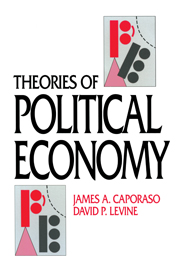Book contents
- Frontmatter
- Contents
- Preface
- Theories of political economy
- Introduction
- 1 Politics and economics
- 2 The classical approach
- 3 Marxian political economy
- 4 Neoclassical political economy
- 5 Keynesian political economy
- 6 Economic approaches to politics
- 7 Power-centered approaches to political economy
- 8 State-centered approaches to political economy
- 9 Justice-centered theories
- Conclusion
- Bibliography
- Index
2 - The classical approach
Published online by Cambridge University Press: 05 June 2012
- Frontmatter
- Contents
- Preface
- Theories of political economy
- Introduction
- 1 Politics and economics
- 2 The classical approach
- 3 Marxian political economy
- 4 Neoclassical political economy
- 5 Keynesian political economy
- 6 Economic approaches to politics
- 7 Power-centered approaches to political economy
- 8 State-centered approaches to political economy
- 9 Justice-centered theories
- Conclusion
- Bibliography
- Index
Summary
Political economy in the classical tradition
In this chapter we explore the classical approach to political economy. The classical economists of the eighteenth and nineteenth centuries were the first to use the term “political economy.” The period covered by classical political economy cannot be stated exactly. A restricted definition would extend from Adam Smith's Wealth of Nations in 1776 to John S. Mill's Principles of Political Economy in 1848. A more encompassing periodization would stretch from the work of the Physiocrats in the middle of the eighteenth century to the death in 1883 of Karl Marx, whom many saw as the last important classical political economist. Marx himself is credited with coining the term “classical political economy” (Dasgupta, 1985:12), dating it from the time of William Petty.
We will divide our consideration of classical political economy into two parts: the argument for market self-regulation and the theory of value and distribution. The first part concerns the nature of the market system and its relation to the state. The second concerns production and use of the economic surplus. The second part draws on more recent contributions within the classical tradition. Although using elements of the classical analytical framework, these recent theories suggest an approach to political economy in some ways at variance with that of the classical economists themselves.
The classical approach frames the central themes of political economy in a distinctive way.
- Type
- Chapter
- Information
- Theories of Political Economy , pp. 33 - 54Publisher: Cambridge University PressPrint publication year: 1992

